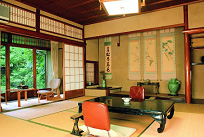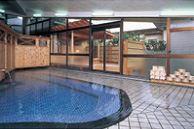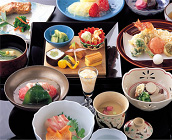What to Expect from a Japanese Inn, "Ryokan"
A "ryokan" is a traditional Japanese inn dating from the Edo period (1603 - 1868), similar to a bed-and-breakfast inn. Traditionally, they served travelers during their journeys. Ryokan typically feature tatami-matted rooms, communal baths, and other public areas. Due to the fact that ryokan were mainly for travelers, nowadays they are hard to find in Tokyo and other large cities compared to hotels. Ryokan are more typically located in scenic areas, such as in the mountains or by the sea, and can charge up to 50,000 JPY (approximately 600 US$) per night per person.

In a typical ryokan, guest rooms are constructed using traditional Japanese methods with tatami floors, and sliding doors. Some inns use hinged doors for security, but they usually open into a small entranceway where guests can take off their shoes before entering the room and stepping on the tatami. Bedding is a futon spread out on the tatami floor. When guests first enter their room, they usually find a table and some supplies for making tea. The table is also often used for meals when guests take them in their room. While guests are out, staff (usually called nakai) will come in, move the table aside, and set out the futon.

Ryokan usually feature a common bathing area, which is often sourced from a hot spring (onsen) if any are nearby. In recent years, many high-end ryokan have started to provide private bathing facilities and rooms which have ensuite hot spring baths. Typically, ryokan provide an authentic Japanese robe known as a "yukata" to wear, and most guests wear yukata when they walk about the facilities of the ryokan and especially when they visit the hot springs.

Most ryokan offer dinner and breakfast, and the quality of the food is often used to appeal to potential guests. Many ryokan give guests the option of enjoying their meal in their room. Meals typically consist of traditional Japanese cuisine known as "kaiseki", which features seasonal and regional specialties. In order to enjoy each dish at the proper temperature, ryokan stress that guests should be punctual for their meals. For this reason, most ryokan ask guests when they want to take their meals. Some ryokans may have a communal dining area, where non-Japanese guests may also have a selection of Western dishes.



